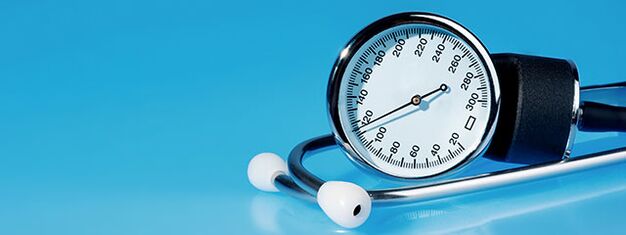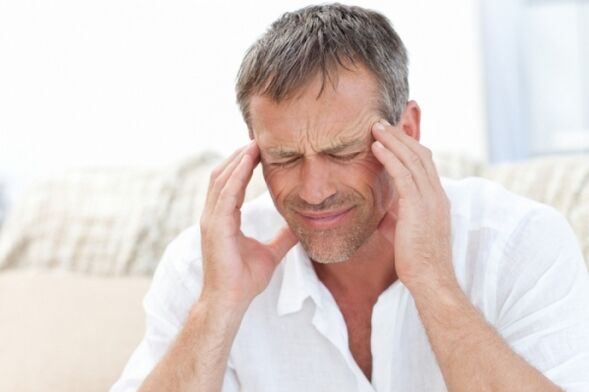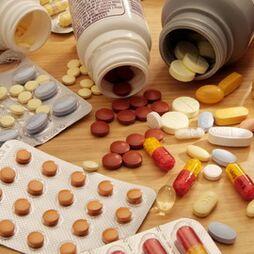Hypertension refers to a number of diseases related to the cardiovascular system. What is high blood pressure and how does it manifest? In medicine, this disease is called arterial hypertension, it is manifested by frequent high blood pressure in humans (from 190 - 40 ml of mercury or more). This disease is a common problem of mankind.

Causes of high blood pressure
Arterial hypertension is a multifactorial disease that develops over a long period of time and does not manifest itself outwardly. The causes and favorable conditions under which hypertension manifests are diverse:
- accommodation;
- stressful situations;
- Professional activities;
- electromagnetic fields and radiation;
- nutritional features;
- pathology of development;
- Diabetes;
- increased cholesterol.
In addition, the cause of hypertension is a genetic factor. High blood pressure in women is caused by difficult childbirth or postpartum stress.
Symptoms of the disease
Usually, the first signs of hypertension do not raise suspicion, since this is a consequence of normal fatigue and overwork. But if you feel a frequent manifestation of symptoms and when the pressure measurement is constantly elevated, you should definitely consult a doctor. Signs of high blood pressure in the early stages:
- headache (developing in the occipital region and surrounding the head), which can occur at any time of the day, aggravated by bending over or making sudden movements;
- pain in the area of the heart, with experience and stress;
- Tinnitus;
- dizziness, blurred vision.
- feelings of anxiety;
- pounding sensation in the head;
- overwork.

With the progression of the disease, the symptoms of hypertension become more and more severe, hypertensive patients have more sweating, facial edema, hand edema, and memory impairment.
A hypertensive crisis is an exacerbation that occurs in a hypertensive patient. An exacerbation is characterized by a sharp increase in blood pressure. This condition can be caused by stress, exercise, or stopping medication.
Patients with hypertensive crisis during exacerbations experience the following:
- feeling nauseous (may start vomiting);
- dark circles in the eyes;
- shortness of breath;
- severe pain in the head and chest;
- blush.
Diagnose
| Basic diagnostic methods | Description |
|---|---|
| Pressure Gauge | A mobile medical device is attached to the patient's waist and a cuff is placed on the shoulder. After a period of time, the cuff is inflated and the mobile device sets the pressure. During the day, blood pressure is recorded every 10-15 minutes, and at night - every 30 minutes. |
| Blood and urine tests | The analysis can determine the level of hemoglobin, hematocrit, potassium, calcium, creatine glucose, indicating the level of cholesterol. |
| Diagnostics with cardiac tools |
|
| Eye check | An ophthalmologist performs an eye exam. In the early stages of the disease, the retinal veins widen and the arteries narrow. |
| Ultrasound of the kidneys and adrenal glands | With an increase in pressure, the nephron, the blood filter, dies in the kidney. This can lead to kidney failure. Medical ultrasound of the kidney showed: tumor in the adrenal gland, possible pathology of kidney tissue. |
Treatment of diseases
During treatment, the patient should lead a calm lifestyle, without stress or emotional overload. Patients need to spend more time outdoors, preferably hiking in the woods, in the park, near the reservoir. It is imperative to follow a diet, as proper nutrition is the key to successful treatment of arterial hypertension.
Medical

Treatment of hypertension depends on the stage of the disease. The main goals of treatment are to reduce the risk of developing cardiovascular complications and prevent death.
The goal of drug treatment is to lower blood pressure, specifically to eliminate the cause of this vascular condition. When initiating antihypertensive therapy, monotherapy and combination therapy are appropriate. When that doesn't work, I use low doses of a combination of antihypertensive drugs.
Antihypertensive drugs are prescribed by the treating doctor after studying the results of the diagnosis. If hypertension occurs, then therapy is carried out with drugs such as:
- Alpha and beta blockers are prescribed for patients with cardiovascular problems. To prevent heart complications, these are the best means, but not the best.
- Vasodilators reduce pressure, but can be used long-term, because the drug is addictive (taken for no more than 2 weeks).
- Long-acting diuretics and calcium antagonists. These drugs normalize blood pressure gradually.
- Administer calcium blockers along with diuretics. These drugs block the absorption of calcium by the vessels, as a result, they expand and the pressure decreases.
Folk remedies
- Sugar beet. Beetroot juice should be taken 3 times in 24 hours, 0. 5-2 cups (2-3 weeks).
- Black Chokeberry. To be treated with this method, you need to drink the juice 3 times a day (2 weeks). After that, the reception is interrupted for a week, after which the treatment continues.
- Garlic. 3 garlic heads and 3 lemons need to be chopped into a meat grinder. Gruel is poured 1. 25 liters. boiling water, infused for a day, brewed. Take 50 ml before meals and 30 minutes before bedtime (3 weeks).
- Cranberries and honey. You need to mix half a glass of cranberry juice and half a glass of honey. Reception is carried out 3 times a day, 1 teaspoon for 2 weeks.
- Medicinal herbs used as non-pharmacological antihypertensive drugs: Roman chamomile, St. John, wormwood, calendula clover. The decoction of these plants can be used to treat and prevent the causes of hypertension, as they have a calming and anti-stress effect.
Diet for high blood pressure

Treatment of hypertension includes diet as an important factor in recovery. Diet in hypertension plays an important role. Therefore, there are recommendations regarding the diet. Limit salty foods, fried foods high in fat. From the diet you need to eliminate butter, beef, mayonnaise, sour cream. Instead of animal fat, you need to choose vegetable fat. Simpler foods are recommended: cereals, vegetables and fruits, foods containing potassium (cheese, potatoes, citrus fruits, dried fruits, oatmeal). Diet and the right food choices will help lower cholesterol, which in turn will lower blood pressure, as well as reduce the harmful effects of sodium on health.
The main rule if arterial hypertension occurs and is detected is very simple - you need to see a doctor, because the person with hypertension should be treated under his or her control.
What is danger?
Central nervous system disorders:
- headache;
- decrease in working capacity;
- The hit.
Disruption of internal organs:
- Acute renal failure. There is an uneven distribution of blood throughout the body.
- Ischemia in the heart. With a significant load, the heart begins to increase like a muscle, and the vessels do not develop, the supply of oxygen is interrupted, while the working force remains unchanged, overload occurs.
- Visual impairment (dilation of large vessels and narrowing of small vessels).
- Violation of sexual function (in men, it occurs due to the intermittent blood supply to the penis, which can cause blockage of the arteries that feed it).
Hypertension entails some additional bias. Hypertension develops and progresses with serious consequences that make treatment more difficult. The risk of stroke and heart attack increases significantly with arterial hypertension. The more advanced the hypertension, the more severe the deviation.
























